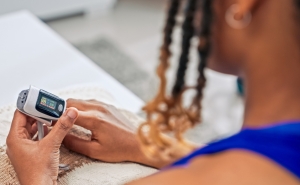How Bloomberg School Researchers are Strengthening Black Americans’ Mental Health

Mental health is intrinsically tied to public health. At the Bloomberg School, research that focuses on the unique experiences of Black people advances the understanding of root causes of mental health issues, helps inform tailored treatment for disorders, and aims to strengthen the overall mental health and well-being of Black Americans.
Here's how five JHSPH researchers are working to improve Black mental health on a variety of fronts.

Depression in Black men
Health, Behavior and Society, Johns Hopkins Center for Health Disparities Solutions
Thorpe founded the Program for Research on Men’s Health at the Hopkins Center for Health Disparities Solutions, where he is deputy director. He also co-directs the DrPH Concentration in Health, Equity, and Social Justice and is a co-founder of the Black Men's Health Survey, designed to advance knowledge of the health trajectory of Black men by assessing their health status, health behavior, and health-seeking behaviors across the life course. One focus of the survey examines psychosocial and behavioral factors associated with depressive symptoms among Black men, as well as how these factors affect cardiovascular risk and physical functioning.
Thorpe and colleagues were the first researchers to study the cumulative health effects on African Americans of financial strain across the life course. The researchers found that life-course financial strain is significantly associated with depression, changes in cognition, and disability in adult African Americans. Participants with financial strain in both childhood and adulthood were more depressed than those who experienced financial strain exclusively in their childhood or in their adulthood.

Community-level suicide prevention
Holly C. Wilcox, PhD
Health Policy and Management, Center for Prevention and Early Intervention, Johns Hopkins Center for Injury Research and Policy
Wilcox studies the effectiveness of community-based universal prevention programs to inform suicide prevention. Based on survey research conducted among more than 800 inner-city Black adults, Wilcox and colleagues found that individuals who had few close relationships among their social contacts were three times more likely to report suicide-related ideation and plan. Social integration among inner-city African Americans is an important factor in predicting suicidal ideation, and therefore could be used to focus intervention strategies on high-risk populations.

Mindfulness as Prevention
Tamar Mendelson, PhD,
Mental Health, Population, Family and Reproductive Health, Center for Adolescent Health, Center for Prevention and Early Intervention, Center for the Prevention of Youth Violence, Johns Hopkins Center for Women's Health, Sex, and Gender Research
Mendelson, trained as a clinical psychologist, develops evidence-based prevention and intervention strategies to improve mental health among African American youth in disadvantaged urban areas who are frequently exposed to chronic stress and trauma. Housing instability, neighborhood violence, and other poverty-related adversities increase risk for emotional, behavioral, and academic problems, including school dropout. Mendelson focuses on schools as a promising setting to evaluate the beneficial effects of mindfulness practices, such as yoga and meditation, as one of the few universal, trauma-informed school-based interventions for urban school-age children.
To measure the effectiveness of mindfulness in improving emotional, behavioral, and academic outcomes, Mendelson and Bloomberg School colleagues are currently studying 800 children in 32 urban public schools. The program is co-led by young adults from the community, and building the capacity of school personnel to continue the program is a key aspect of the research.
- A randomized controlled trial of a trauma-informed school prevention program for urban youth: Rationale, design, and methods
- Electronic and school bullying victimization by race/ethnicity and sexual minority status in a nationally representative sample of adolescents in the United States

Intersectional approaches
Michelle R. Decker, ScD, MPH
Population, Family and Reproductive Health, Center for AIDS Research, Center for Public Health and Human Rights, Johns Hopkins Center for Women's Health, Sex, and Gender Research
Decker’s research focuses on social determinants of women's health and gender equity, with an emphasis on gender-based violence such as sexual assault, intimate partner violence, and sex trafficking. Much of this work involves Black women within marginalized urban populations, including adolescents and those involved in transactional sex or sex work.
In her Women's Health course, Decker includes mental health and racial health disparities as major components of women’s health. The course equips students to describe and apply conceptual frameworks of health disparities and intersectionality that consider how the multiple simultaneous identities of people at risk interact to shape mental health outcomes.

Gender violence and race
Tiara Willie, PhD
As a social epidemiologist, Willie studies the distribution, determinants, and health consequences of gender-based violence (e.g., intimate partner violence, reproductive coercion, child sexual abuse) in order to reduce the prevalence of violence and related comorbidities. As a National Institute on Minority Health and Health Disparities Scholar, Willie has studied how substance use, gender violence, and depression influence racial disparities in women’s willingness to practice preexposure prophylaxis, in turn shaping their risk of HIV infection.
In interviews with more than 200 women experiencing intimate partner violence, of whom 67% were Black, Willie found an increased risk of engaging in sexual risk behaviors and experiencing depressive and posttraumatic stress symptoms. The interviewees reported the number of adverse childhood events (ACEs) they had experienced, which are associated with increased risk for poor sexual and mental health. Willie’s analysis showed that the number of ACEs directly predicted women’s IPV victimization severity and depressive and posttraumatic stress symptoms.
- Racial and ethnic differences in women's HIV risk and attitudes towards pre-exposure prophylaxis (PrEP) in the context of the substance use, violence, and depression syndemic
- The Impact of Adverse Childhood Events on the Sexual and Mental Health of Women Experiencing Intimate Partner Violence

Intimate partner violence
Charvonne N. Holliday, PhD
Population, Family and Reproductive Health, Johns Hopkins Center for Health Disparities Solutions, Johns Hopkins Center for Women's Health, Sex, and Gender Research
Holliday, Wilcox, and Decker collaborate to study how intimate partner violence (IPV) contributes to and is shaped by racial disparities. Since IPV is associated with a higher risk of HIV, unintended pregnancy, poor mental health, substance use, and other health issues, their work on IPV has the potential to mitigate many of its downstream effects. In addition to Holliday’s research on ways to enable survivors of IPV to navigate barriers to seeking help, she is also exploring innovative intervention strategies for male IPV perpetrators.
Holliday and colleagues found that those most likely to use violence against their partner are men who “have had some form of childhood trauma or neglect, who have witnessed violence in their home, have been participants or victims of street-based violence.” As a postdoctoral fellow at the Bloomberg School, Holliday interviewed more than two dozen East Baltimore men in groups and individually to discover what they thought were the main causes of abuse, but many said they couldn’t verbally express or describe emotion. She concluded that “men want to talk about their feelings and some of them really opened up and shared some of their deepest secrets and how that influences their behavior."
Ultimately, Holliday stated, “men preventing violence against women starts with how men talk about and to women.”
Karen Kruse Thomas, PhD, is the Bloomberg School historian.




